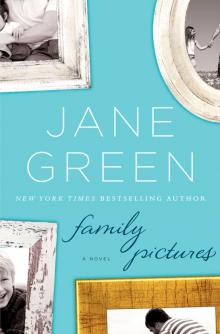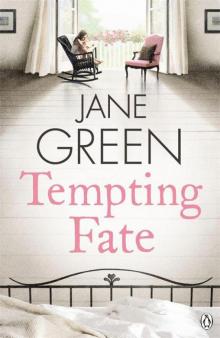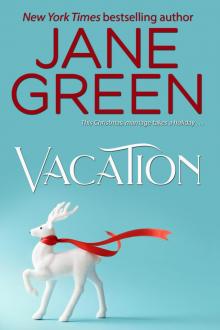- Home
- Jane Green
To Have and to Hold Page 2
To Have and to Hold Read online
Page 2
Joe had sworn his womanizing days were behind him, had vowed he would be faithful, causing much mirth among his friends. The evening before, on his stag night, they had organized a high-class call girl to be waiting in a limo. It was a test, they had said, a test to see whether he really would be faithful.
“I will pass,” he had said assuredly when they told him of their plan, and several saketinis later made his way out to the limo, fully intending to tell the call girl thanks, but no thanks. He was greeted by a mane of the exact shade of honey-blond hair that he loved, legs that went on forever, and a Wonderbra that was truly wonderful to behold.
“Oh, shit,” he groaned, climbing into the car. “I suppose a final fling wouldn’t hurt.”
It was a marathon, extraordinary, incredible night. He had woken up this morning at the Sanderson Hotel feeling guilty as hell and then felt a hand start to slowly stroke his thigh, and, oh, what difference would a morning screw make? After all, she’d clearly been paid for the night. And it’s only sex.
And Alice will never know.
“So did you get our money’s worth?” Adrian persists.
“She was a six-foot Russian blonde with a figure that would make Lara Croft jealous and a mouth that never slept. What do you think?”
Adrian doubles over and groans in envy. “Fuck,” he spits through his teeth. “I knew it. So was it the best night of your life?”
“Adrian! Please!” Joe looks shocked. “Tonight will be the best night of my life.”
“But it was a close second?” Adrian grins.
“Very, very close. And as a final fling Svetlana couldn’t have been more perfect.”
“Svetlana?” Adrian snorts with laughter. “Was that her real name?”
“Do you know,” Joe says nonchalantly, turning to head back to the church, “I don’t actually care.”
Joe had never thought he was going to get married. Had been quite happy living the quintessential bachelor lifestyle, but by his early thirties he’d started to think it might be quite nice to have some permanence, someone to come home to, to look after him.
The problem was that the girls he went out with were about as far away from wife material as you could possibly get. Yes, they looked great. Tall stunning blondes, the occasional brunette or redhead, they were all polished to perfection, but were so cold, so brittle, Joe sometimes thought that if he bent them the wrong way they might snap.
They were women who were waiting for a rich husband to provide them with a lifestyle their beauty had led them to believe they could expect. They had no careers, avoided the news as if they could catch something nasty from it, couldn’t cook, didn’t clean, had never ironed a thing in their lives (“Darling, if God had meant us to iron he wouldn’t have invented dry cleaners”), and had a deep-rooted fear of marrying a man who couldn’t afford a “woman that does.”
They expected certain things of Joe—dinners at the Ivy and Hakkasan, nights out at Atticus and Home House, the odd treat from Harvey Nicks—and in return they gave him unlimited performance sex, little pressure (these girls knew that the best way to hook their fish was to let the line run as long as possible), and the guaranteed envy of every man he knew. It was only once they started expecting commitment that Joe would turn around and tell them in the nicest way possible that they’d had a wonderful time together, but that he knew it wasn’t meant to be, and on he would go to his next conquest.
He knew he didn’t want to marry a woman who wanted him only for his bonus (although his looks and personality weren’t exactly negligible), and he knew he wasn’t going to find the woman he would marry in the trendy bars, restaurants, and clubs he frequented, but there was something about glossy, streaky blond hair, a leg clad in Wolford stockings, breasts pushed up in La Perla that he just couldn’t resist.
And then he met Alice. Alice who turned scarlet when he said her name, who remembered him from school, even when he had no recollection of ever meeting her. Alice who had loose mousy curls and didn’t wear a scrap of makeup. Who wore cheap black leggings and baggy shapeless sweaters to disguise her curves. He wouldn’t normally have looked twice at a girl like Alice, but he was amused by the way she blushed every time he looked at her, and there was something very sweet about her, and sweetness was not a character trait he was used to in women.
She was sweet, and she was grateful, which in turn made Joe feel generous and kind, rather like a benefactor. She didn’t expect anything of him other than his company, and when he gave her what she wanted she seemed in a state of permanent disbelief that he would be with a girl like her.
Plus, he realized very quickly that Alice had a huge amount of potential. She was a lovely girl, she could cook fantastically, she’d definitely look after him, and it wouldn’t take much to make her look a whole hell of a lot better. With a diet, a decent hairdresser, and a new wardrobe, she’d be a whole new woman by the time he’d finished with her.
2
December 24, 2001
“Need help with your bags, love?” The cab driver makes a halfhearted attempt to open the door, but the woman stops him.
“Don’t worry.” She smiles with uncharacteristic warmth (because God knows, he knows the type, and he’s usually lucky if he gets a thank you, let alone a smile). “I’ll manage. Merry Christmas!” And she collects her bags and walks up to her door.
The cab driver sits and watches her for a minute. Great legs. Great smile. Great hair. If only he were a few years younger. But see that huge rock on her left hand? The alligator handbag that screams money and class? Look at the address, must be where she lives. Belgravia indeed. He shakes his head as he drives off to the Lanesborough to try to pick up some rich American tourists (the tips make the wait worthwhile). Girls like that were always out of his league.
After clattering up the front steps and opening the door, Alice dumps her bags just inside and kicks off her heels. “Bloody Jimmy Choos,” she mutters, leaning down to massage her instep, grateful for the cool limestone floor against her aching feet. “Bloody Beauchamp Place. Bloody shopping.”
She pulls some beautifully gift-wrapped boxes out of the bags at her feet and leans down to arrange them underneath the huge Christmas tree, sweeping aside the iced white crystal balls that hang from the branches and catch in her straightened, streaked hair.
During their first Christmas together, Alice had planned to decorate the tree with Joe. She’d spent hours searching for Christmas decorations: brightly colored wooden soldiers, colorful beads, multicolored fairy lights, and strings of glittering tinsel. Joe had phoned to say he was stuck in a meeting, so Alice had decided to surprise him by decorating the tree herself.
She loved every minute of it. When she’d finished, she sat on the floor gazing up at the tree while eating popcorn out of a huge bucket, remembering all her childhood Christmases, dying for Joe to come home and see the tree, how lovely, and festive, and homely it looked.
When Joe walked in and saw the tree, he froze.
“What. Is. That?”
“That’s our tree,” Alice laughed, putting down the popcorn and running up to kiss him.
“But what is all that stuff on it?”
“Those are our decorations.” Alice spoke slowly, as if to a child.
“No.” Joe shook his head as Alice tried to understand. “No.”
Now Alice understands.
Joe had taken everything off the tree and come home the next day with new decorations. Everything, he said, had to be white, or he refused to have a tree. White crystal balls, the best money could buy, tiny white fairy lights, and white velvet bows as a concession to tradition. Even the fairy had to go, and now their tree is topped by a brushed silver pyramid.
Alice has never managed to feel the same way about Christmas again, although now, gazing up at her twelve-foot Norwegian spruce, glittering icily in the subdued lighting of the lobby, she has to admit it may not be festive, or even particularly pretty, but it’s certainly impressive.
Th
eir whole house is impressive, for that matter, although Alice has become immune to it now. They had employed an architect known for his modern, minimalist style to gut what had once been an old garage that specialized in redoing vintage cars and turn it into a designer haven.
Limestone floors and glass ceilings. Stainless steel fixtures and hard square modern furniture, shades of coffee and cream, not a color to be seen. And then that huge, impressive foyer, two storys high, large enough to house a Christmas tree bigger than Alice had ever seen before outside of Trafalgar Square.
Alice walks upstairs to the open-plan kitchen and switches on the kettle (Alessi) for a quick cup of tea. Tonight is their five-year anniversary, and they’re off to Nobu—Joe’s favorite—for dinner. She checks the clock on the microwave—6:14. The table’s booked for eight-thirty, but she has learned to be twenty minutes late for everything, and even then she usually arrives before Joe.
Alice has become used to walking into restaurants, parties, events, alone. She has perfected the art of small talk, of wearing a serene smile on her face at all times to hide her discomfort and awkwardness.
Joe is invariably late, or away. Alice used to try to cancel if Joe suddenly announced he was going to be away, but she has obligations now, commitments, and it is not always easy to come up with a new excuse. If Joe is in London, merely working, she knows he will eventually turn up, his tie askew, his mind clearly elsewhere, and Alice, who would once have been appalled by his rudeness and disrespect, has learned to accommodate even this, but she is not happy about it.
This is not the life Alice imagined herself leading. This is not the marriage Alice imagined herself to have. And Joe is not the knight in shining armor she had once thought.
She hates sitting in restaurants by herself, feeling the other diners glance at her with curiosity (I haven’t been stood up, she feels like announcing, my husband will be here in a minute), yet she puts up with it because there is a small part of her that still enjoys seeing Joe walk in, stepping outside her role as his wife, pretending she is just another diner, feeling again the thrill of her attraction to this man.
So tonight, their anniversary, Joe will be late. He may or may not phone first and apologize in advance, but she is quite sure he will make it up to her with wonderful flowers and a wonderful present, probably jewelry, at which she will gasp with delight, although she now has a safe full of wonderful jewelry, which she neither needed nor particularly wanted.
Alice would happily exchange her jewelry for more time with her husband. She married him dreaming of their shared lives together, but finds that she is far lonelier now than she ever was before. At least in her single days she had her career, and Emily, but the only cooking she does these days is when entertaining Joe’s business clients and occasionally friends, and Emily is so busy living her single life, Alice just doesn’t seem to see her much anymore.
Alice takes her tea upstairs and starts to run a bath, sitting on the edge of the tub as she examines herself in the mirror opposite, feeling as she so often does these days that she is looking at a stranger, barely able to recognize the person she has become.
There have been occasions, over the last few years, when she has run into former clients at parties. They are always charm personified, and not one of them has ever recognized her.
There have even been times when she has mentioned that she once had a catering company, and they have said, “Really? What was it called?” because these are people who use catering companies on a regular basis, and when she has told them the name they have said, “Oh, yes. I think I might have used them once a long time ago.” They have no idea that Alice has studied their kitchens, knows their cupboards, their fridges, what brand of kitchen towel they use.
But why should they recognize her? Alice thinks, sipping her tea, remembering the girl she used to be. Gone now is the mousy, curly hair. Gone the pale, wan skin free of makeup. She crosses her legs and looks down at her tight Gucci trousers that show off her long, lean legs, splays her fingers to look at the short, square nails, French-polished to perfection, stands up and leans on the counter, moving her face toward the mirror to better examine what she sees.
Her hair now falls in a streaky sheet, all hint of mouse hidden by honeys and caramels; her skin is lightly tanned, her makeup subtle and her clothes sophisticated. She now wears only the best of the best, even though she has a pathological hatred of high heels and feels like a trussed turkey in the little fitted jackets Joe likes.
Her favored, favorite old Levi’s are still in her closet, but she couldn’t wear them now. Sometimes she tries them on as a reminder of who she is, who she once was, but the jeans are now so big she can pull them on and off without even undoing them.
The jeans she wears these days, on the rare occasions she wears jeans, are Earl, or Diesel. They are dark denim, low-slung on the hips, flaring ever so slightly and sexily over her pointed boots. She wears them with delicate chiffon Alberta Ferretti tops, under a long shearling coat with a huge fox collar. These are her outfits for pretending she and Joe are trendy, hip Londoners, for pretending they are ten years younger than their age, for those nights they go to Hush, or Home House, or the K Club.
Alice can pull off this look, despite her age, because she doesn’t really care. Clothes have never interested her, do not interest her now, but she knows she has to play the part, and she has always been good at fitting into different roles. Not to mention different clothes.
There used to be mornings, before her transformation was complete, when Alice would come down for breakfast in one of her old, baggy sweaters, but Joe has taught her always to look her best, even if only nipping out for milk, because, after all, she never knows whom she might bump in to. Alice doesn’t much care whom she bumps in to, or what she looks like, but she wants to make Joe happy, and if looking perfect keeps Joe happy, then she will do her best to look perfect, twenty-four hours a day.
At night she wears delicate silk negligées, with matching robes and Loro Piana cashmere slippers. She still has a pair of men’s flannel pajamas from days of old, and when Joe is away she clambers into the pajamas and snuggles up in bed, television remote control in one hand, thickly buttered toast and honey in the other. (Joe does not allow breakfast in bed: the crumbs might—God forbid—get into the sheets.)
The phone rings sharply, bringing her running from the bathroom, and her heart sinks as she sees Joe’s mobile number flash up on caller display.
“You’re going to be late, aren’t you?” Her voice is flat.
“Oh, darling, I’m so sorry. I’m stuck in this bloody meeting, and”—he drops his voice—“I did tell them it was my anniversary tonight, but work is work, and it shouldn’t go on too late. I just want you to make the reservation nine. I’ll definitely be there for nine.”
“Joe, it’s our anniversary. Why tonight of all nights? Why are you always working?” Alice cannot help the anger in her voice. Their arguments are always the same: his work, his traveling, his absence. “What do you want me to do?” he usually hisses. “Leave my job? We’d have to sell the house, change our lifestyle. You’d like that, would you? You want to have no money? Fine. Just say the word and I’ll leave.”
Or her personal favorite: “I’m doing this for you, you know.”
“You think I like the traveling?” he’ll try from time to time. “You think I like getting up at four in the morning to go to the airport, flying to meeting after meeting, missing you and just wanting to be home? You think it’s any fun for me staying in hotel rooms all the time, with no friends, no family, going to one boring business dinner after another?”
I am not stupid, Alice thinks. I know all about your business trips. I know about the big, black plush Mercedes that drives you to Heathrow. I know about your first-class travel and your gold executive card for British Airways. I know about your hotels—the Four Seasons and nothing less. I know about your six-course gourmet client dinners, with rare, fine wines, Cuban cigars, and vintage ports.
Oh, the sheer hell of it!
Alice does turn around from time to time and say, “Yes. That’s exactly what I want. I’d love to sell this bloody museum of a house, and I’d love to change our lifestyle. You think I care about all this stuff? I don’t care, I’d love a little house outside London. Go on. Leave. Leave your bloody job.”
“Fine!” he would say defiantly. “I’ll leave tomorrow.” And usually that’s the last she’ll hear of it until the next row.
Now, on the telephone, Joe takes a sharp intake of breath and drops his voice low. “Alice, I do not need to have an argument now. I am in a meeting, and it will run slightly later than I had planned. I am not prepared to get into this on our anniversary.” His voice is stern, and Alice doesn’t have the energy to fight.
“Please don’t be later than nine,” she says eventually.
“I’m sorry, darling.” The relief in his voice is audible, relief at Alice’s acceptance, her lack of anger. “I promise I’ll be there for nine and I’ll make it up to you.”
Alice sighs. What else can she do? “I’ll see you at nine. I lo—” She stops. The phone has already been cut off.
She leans back on the pillows and looks at the photographs on the wall at the end of the bed. Three photographs, black and white, blown up, of Joe and Alice looking like the happiest people on earth. It could almost be an ad for Calvin Klein, so perfect do they look. But Alice remembers that day well. The photographer grew more and more impatient waiting for Joe to arrive, and Alice remembered trying to placate him, to make him laugh. When Joe finally did arrive they had five minutes before the photographer had to go to another job (he couldn’t let them down—Vogue). Both Alice and Joe were amazed that in such a short space of time he managed to produce pictures this beautiful.
Alice gazing directly into the camera, the sadness in her eyes already apparent, looking pensive, and wistful, and very beautiful. Joe kissing Alice’s forehead, an apology for the delay, his profile in shadow, her profile a sharp chiaroscuro of light. Joe cuddling Alice, his strong arms wrapped tightly around her, chin nestled in her shoulder, a cheeky smile on his face, her eyes lit up with laughter and love.

 Saving Grace
Saving Grace Summer Secrets
Summer Secrets Straight Talking
Straight Talking Family Pictures
Family Pictures The Holiday
The Holiday Promises to Keep
Promises to Keep Second Chance
Second Chance The Sunshine Sisters
The Sunshine Sisters Dune Road
Dune Road Bookends
Bookends The Beach House
The Beach House Mr. Maybe
Mr. Maybe Tempting Fate
Tempting Fate Vacation
Vacation The Other Woman
The Other Woman The Friends We Keep
The Friends We Keep To Have and to Hold
To Have and to Hold Falling
Falling Swapping Lives
Swapping Lives This Christmas
This Christmas Life Swap
Life Swap Cosmo's Sexiest Stories Ever
Cosmo's Sexiest Stories Ever